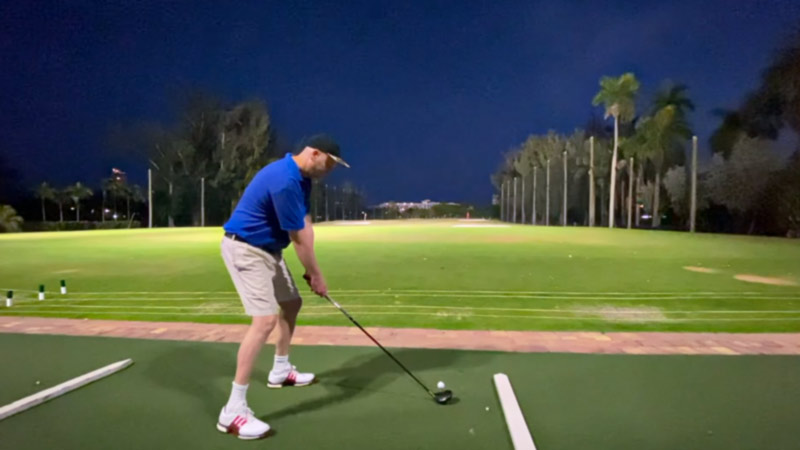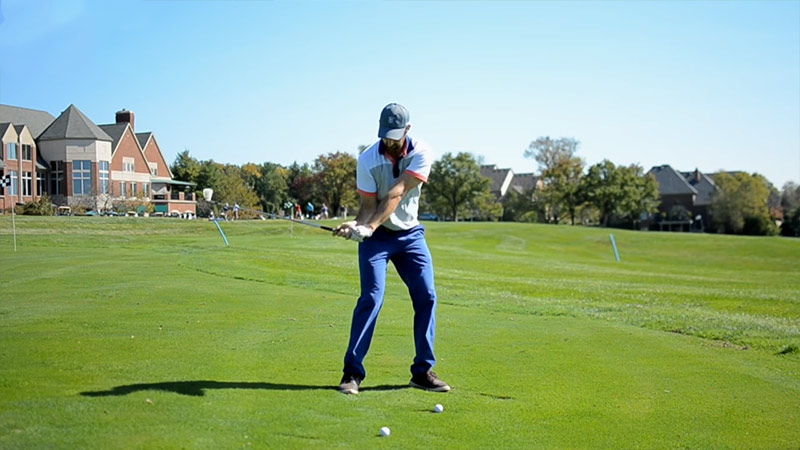Mastering the art of golf requires more than just a powerful swing; it demands precision, strategy, and the ability to choose the right club for the right shot. As golfers step onto the driving range, the array of clubs in their bag can be both exciting and daunting.
Selecting the appropriate club for the specific practice session is a crucial aspect of honing skills and building a well-rounded game.
In this blog post, we delve into five frequently asked questions about choosing the right golf club at the driving range, offering insights to help players refine their practice routines and elevate their performance on the course. Stay focused.
What Is the Driving Range In Golf?
The driving range in golf is a designated practice area where golfers hone their long-distance shots. It’s equipped with multiple hitting stations, each featuring tees to place golf balls on.
Golfers use various clubs, mainly drivers and woods, to hit balls into the range, which is typically marked with distance indicators. This allows players to work on their swing technique, control, and consistency, aiming for different distances.
Driving ranges offer a controlled environment for golfers to practice without the pressures of a course, enabling them to refine their skills and build confidence in their long shots. It’s a vital component of golf training and skill development, helping players enhance their performance when out on the actual golf course.
How to Choose the Right Golf Club To Use At Driving Range?
Choosing the best golf club for driving range depends on your goals and what you aim to practice. Here’s how to select the best club for your driving range session:
Start with the Driver
The driver is designed for maximum distance off the tee. If your focus is solely on improving your long shots, using the driver is a great choice. It helps you work on your swing mechanics and generate power.
Work on Precision with Irons
If you want to practice accuracy and ball control, using irons (mid-irons like 7 or 8 iron) is a good option. They have shorter shafts and can help you refine your swing for more controlled shots.
Experiment with Woods
Fairway Woods (3-wood, 5-wood) offers a balance between distance and control. They can be helpful if you’re working on shots that require more accuracy than the driver but still need some distance.
Hybrids for Versatility
Hybrids combine features of irons and woods, offering forgiveness and distance. Using hybrids can help you practice a wide range of shots, making them a versatile option.
Short Game Practice
While the driving range is mainly for long shots, you can also practice your short game with wedges. This includes pitching, chipping, and even bunker shots if your driving range has a practice bunker.
Rotate and Mix
To develop an all-around game, rotate through different clubs during your practice session. Start with the driver to warm up and then move to irons, fairway woods, and wedges.
Focus on Goals
Consider your current goals. If you’re struggling with a particular aspect of your game, such as hitting long distances off the tee or improving accuracy, choose the club that aligns with those objectives.
Ask for Professional Advice
Golf pros or instructors can provide personalized recommendations based on your skill level, goals, and swing mechanics. They can help you identify which club would be best for your practice needs.
Remember, the driving range is about improvement, so use clubs that challenge you and help you address your weaknesses.
Best Golf Club for Driving Range

When selecting the best golf club for specific shots at the driving range, consider the following options:
Pitching Wedge
The pitching wedge is an excellent choice for practicing short approach shots and working on your accuracy. Use it to focus on your chipping, pitching, and distance control around the green.
7 Iron
The 7 iron is a versatile club that allows you to practice mid-range shots. It’s great for refining your swing mechanics, ball-striking consistency, and distance control on the fairway.
5 Iron
For longer approach shots, the 5 iron is beneficial. It helps you practice hitting longer distances with more loft than your woods or driver. Work on generating power and maintaining accuracy with this club.
Fairway Wood (3-wood or 5-wood)
Fairway woods are ideal for practicing shots that require distance and accuracy from the fairway or tee. Use them to focus on hitting solid shots off the ground and building consistency in longer shots.
Driver
The driver is the go-to club for practicing your tee shots. It’s designed for maximum distance, so use it to work on your tee shot technique, generating power from the hips, and hitting straight and long drives.
To make the most of your practice session, follow these steps:
Warm Up
Start with a few swings using a wedge to warm up your muscles and establish a consistent rhythm.
Progressive Approach
Begin with shorter clubs like wedges and irons to build your confidence and refine your swing mechanics. Then gradually move on to longer clubs like Fairway Woods and the driver.
Consistency Over Distance
Focus on hitting shots consistently with good form rather than solely chasing distance. Accuracy and technique are key to improving your overall game.
Vary Your Shots
Experiment with different shot types (fade, draw, straight) and targets on the range to simulate real course scenarios.
Record and Analyze
If possible, record your swings or use launch monitor technology to analyze your shots and identify areas for improvement.
What Iron to Use at Driving Range?
When choosing an iron to use at the driving range, it’s generally recommended to start with a mid-iron, such as the 7 iron or 6 iron.
These clubs strike a balance between loft and distance, making them versatile options for practicing various aspects of your iron game. Here’s why the 7 iron is often a good choice:
Versatility
The 7 iron is considered a middle-of-the-road club in terms of loft and distance. It can be used for approach shots from the fairway, as well as for practicing shots from the rough or challenging lies.
Consistency
Mid-irons like the 7 iron are often chosen for their consistency and forgiving nature. They can help you work on ball-striking, accuracy, and distance control without the extremes of longer or shorter irons.
Swing Mechanics
Using a 7-iron allows you to focus on your swing mechanics without the added challenge of the longer clubs or the precision required with shorter irons.
Distance Control
The 7 iron provides a good balance between distance and control, making it suitable for practicing shots that require moderate distance without sacrificing accuracy.
Shot Variety
You can use the 7 iron to practice a variety of shots, including full swings, half swings, and pitch shots. This versatility allows you to work on different aspects of your iron game.
Of course, your choice of iron may also depend on your personal preferences and the specific areas of your iron play that you want to improve.
If you’re looking to practice longer approach shots, you might consider using a 6-iron or 5-iron. Conversely, if you want to work on your short approach shots, a 9 iron or pitching wedge could be more suitable.
Tips to Practice Irons At The Driving Range
Practicing irons at the driving range can significantly improve your ball-striking consistency, accuracy, and distance control. Here are some effective tips to make the most of your iron practice sessions:
Start with a Plan
Define specific goals for your practice session. Are you working on distance, accuracy, ball flight, or something else? Having a clear plan will keep your practice focused and productive.
Choose the Right Clubs
Begin with mid-irons like the 7 iron or 6 iron. These clubs provide a good balance between loft and distance, making them ideal for improving your iron play.
Warm Up Properly
Start with some gentle stretches and a few swings with a wedge to warm up your muscles and get into the rhythm.
Work on Your Setup
Focus on a consistent setup for every shot. Pay attention to your grip, stance, ball position, and alignment. A consistent setup is crucial for developing a repeatable swing.
Start with Half Swings
Begin your practice with half swings. This helps you concentrate on your mechanics, balance, and rhythm before moving on to full swings.
Focus on Ball-First Contact
Strive to make solid ball-first contact on every shot. This means striking the ball before the ground, which leads to better distance and accuracy.
Use Targets
Aim at specific targets on the range. Visualizing a target helps simulate on-course scenarios and keeps your practice purposeful.
Vary Your Targets
Practice hitting shots to different target distances and directions. This will help you develop versatility and adaptability in different situations.
Monitor Your Divots
Pay attention to your divots. They should be in front of the ball and show a shallow angle of attack for crisp iron shots.
Work on Shot Shaping
Experiment with shaping shots (fade and draw) to enhance your control over the ball. Learning shot shapes can be valuable in the course.
Take Your Time
Don’t rush through your practice swings. Take your time to analyze each shot, adjust as needed, and build muscle memory for a consistent swing.
Use Video or Mirrors
If possible, record your swings or practice in front of a mirror. Visual feedback can help you identify flaws in your technique.
Stay Patient
Improvement takes time. Don’t get frustrated if you don’t see immediate results. Consistent practice over time will lead to better iron play.
Track Your Progress
Keep a practice journal to document your goals, achievements, and areas that need further work. Tracking progress can boost motivation.
Stay Positive
Maintain a positive mindset. Focus on your successes and the improvements you’re making, no matter how small they may seem.
FAQs
Which Club Should I Start With?
Starting with a mid-iron like the 7 iron is often recommended. It strikes a balance between distance and loft, making it suitable for honing your ball-striking accuracy and consistency.
What’s the Benefit of Using Fairway Woods at the Range?
Fairway woods, like the 3-wood or 5-wood, are excellent for practicing shots that require distance and control. They enable you to work on your fairway shots, helping you fine-tune your technique for various course situations.
How Can I Improve My Driver Shots at the Range?
For improving driver shots, practice with your driver itself. It’s specifically designed for maximum distance off the tee. Use this time to focus on generating power from your hips, maintaining a controlled swing, and achieving consistent ball flight.
Should I Practice Short Game Shots at the Driving Range?
While the driving range is primarily for longer shots, practicing short-game shots can be valuable. Some ranges have practice bunkers and pitching areas where you can work on your sand shots and delicate pitches.
How Can I Choose Clubs to Practice Different Shots?
To practice different shots, consider your objectives. Use wedges for short shots, irons for approach shots, and fairway woods/driver for tee shots. Varying your club selection helps develop a comprehensive skill set.
Wrapping Up
As you step onto the driving range armed with knowledge about club selection, remember that practice is a journey of improvement. Whether you’re aiming for pinpoint accuracy, increased distance, or better control, choosing the right golf club can significantly impact your progress.
By starting with mid-irons, experimenting with fairway woods, focusing on driver shots, occasionally incorporating short game practice, and tailoring your club selection to the shots you wish to practice, you’ll be well-equipped to refine your skills and take your golf game to the next level.
So, grab your clubs, head to the range, and watch your practice sessions translate into success on the golf course. Thank you so much.







